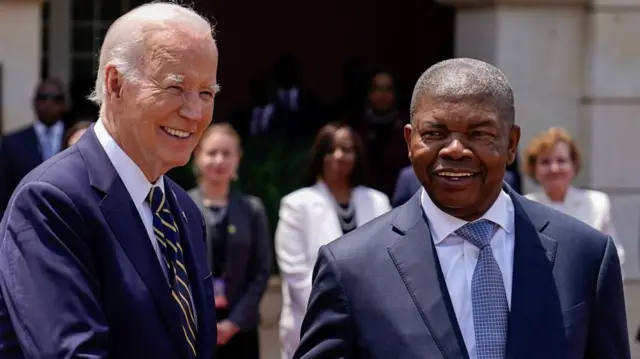
Following Biden’s Visit, What’s Next for Angola?
The President’s visit to the oil-producing nation comes on the heels of revealing disclosures from U.S. oil, gas, and mining companies.
By Aubrey Menard
In his final month in office, President Biden traveled to Angola, making the first visit of a U.S. President to sub-Saharan Africa since 2015. As President Biden visited the second-largest oil-producing country in sub-Saharan Africa, a significant moment was also taking place in the global oil and gas industry. After years of resistance from the industry, a new U.S. rule made it mandatory for resource extraction companies to disclose payments made to governments—including those with poor records on transparency and human rights. This development couldn’t be timelier as Biden met with Angolan President João Lourenço to discuss strengthening democracy and civic engagement, as well as intensifying action on climate security and the clean energy transition.
As the new disclosures revealed, four US-listed oil companies collectively paid the Angolan government $7.62 billion last year alone. As activists fought for these disclosures, Angola was at the forefront of our minds as a country that could benefit greatly from this transparency. The country was long regarded as the paragon of the resource curse—while wealth flows into government coffers, average Angolans continue to live in poverty. While the former president’s daughter became the richest woman in Africa amid repeated allegations of embezzled funds and charges off of embezzled funds and charges of defrauding the country, a quarter of the country’s children didn’t attend school, and almost 20 percent died before their fifth birthday. The newly-in-force U.S. transparency rule could help Angola, and other nations in similar situations, take meaningful steps toward true accountability.
Since the end of September, oil, gas, and mining companies listed on U.S. exchanges are now required to disclose payments made to governments around the world. This mandate is part of Section 1504 of the Dodd-Frank Wall Street Reform and Consumer Protection Act, a law passed nearly a decade and a half ago but long delayed due to industry pushback. This transparency will shine a light on previously opaque financial relationships between resource extraction corporations and government officials—relationships that have historically been shrouded in secrecy, enabling corruption to flourish.
The implications of this rule are profound. In Angola, where the government derives much of its revenue from oil, knowing exactly how much money is coming from what companies could empower civil society to hold both the government and multinational corporations accountable for how resource wealth is managed. It also provides U.S. investors with critical information about the risks and ethical implications of their investments in resource-rich but governance-poor countries. Angola is not alone in facing these challenges—across the globe, countries rich in oil, gas, and minerals often struggle with poverty and corruption, with little of the resource wealth trickling down to benefit ordinary citizens.
For years, the oil and gas industry resisted these disclosure requirements, as transparency threatened to expose the extent of their financial dealings with corrupt and authoritarian regimes. But following concerted advocacy form from groups like Oxfam America and Publish What You Pay and bolstered by legal victories that forced the U.S. Securities and Exchange Commission (SEC) to finalize the rule, the industry’s era of secrecy is coming to an end.
The $7.62 billion that flowed to Angola last year came from oil majors ExxonMobil, Chevron, Equinor, and Total Energies. This constituted 37 percent of the government’s total revenue for the same year. With US-listed oil and gas companies, some of whom have been historically opposed to the energy transition, having such an outsized impact on the Angolan economy, how will President Biden’s priorities of intensifying action on climate security land?
President Biden’s visit to Angola offered a unique opportunity to link the ongoing fight for transparency in the oil and gas sector with broader efforts to strengthen democracy, enhance peace and security, and promote sustainable economic growth. Indeed, since 2017, when former President dos Santos ended 37 years in power, Angola has seemingly been on a journey towards greater transparency. Though picked by dos Santos, his successor, President Lourenço embarked on an anti-corruption drive, judicial reforms, prosecution of high-ranking officials, and an asset recovery drive. But despite initial enthusiasm, Angolans believe that corruption is once again on the rise.
As Angola seeks to diversify its economy and transition to clean energy, the ability to hold government officials and corporations accountable for resource revenue management will be critical. Transparency in these payments can help ensure that Angola’s oil wealth contributes to national development rather than fueling further corruption and inequality.
Moreover, U.S.’ focus on infrastructure projects like the G7’s Partnership for Global Infrastructure and Investment (PGI) is a step in the right direction. But for these projects to truly benefit Angola’s people, they must be underpinned by a commitment to transparency and good governance. By requiring U.S.-listed companies to disclose their payments to foreign governments, the U.S. is setting a global standard for accountability—one that could inspire similar efforts across the African continent and beyond.
Now, with nascent U.S.-Angola collaboration and strengthened economic ties, the transparency rule offers a critical lever for ensuring that the benefits of these partnerships are shared by all Angolans, not just the powerful few. By shining a light on corporate payments to governments, the U.S. is helping to create the conditions for more responsible resource management, which in turn can contribute to more stable and prosperous societies.
The world will be watching closely as the disclosures are made annually. Civil society groups, investors, and citizens alike have an unprecedented opportunity to use this information to ask tough questions, demand further transparency, and ensure that natural resource wealth benefits the people of Angola and other resource-rich nations. For too long, these revenues have been hidden from view, enabling corruption and inequality to persist. Now, with transparency as a tool, we have a chance to change that.